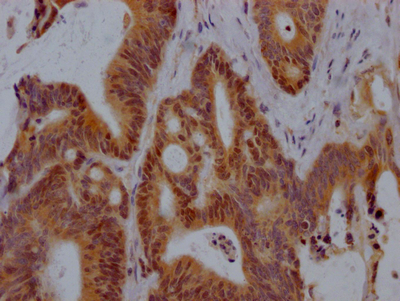TANK Antibody
-
货号:CSB-PA006359
-
规格:¥880
-
图片:
-
其他:
产品详情
-
Uniprot No.:Q92844
-
基因名:
-
别名:I TRAF antibody; I-TRAF antibody; ITRAF antibody; Tank antibody; TANK_HUMAN antibody; TRAF family member associated NF KAPPA B activator antibody; TRAF family member associated NFKB activator antibody; TRAF family member-associated NF-kappa-B activator antibody; TRAF interacting protein antibody; TRAF interacting protein TANK isoform a antibody; TRAF interacting protein TANK isoform b antibody; TRAF-interacting protein antibody; TRAF2 antibody
-
宿主:Rabbit
-
反应种属:Human,Mouse,Rat
-
免疫原:Synthesized peptide derived from the Internal region of Human TANK.
-
免疫原种属:Homo sapiens (Human)
-
标记方式:Non-conjugated
-
抗体亚型:IgG
-
纯化方式:The antibody was affinity-purified from rabbit antiserum by affinity-chromatography using epitope-specific immunogen.
-
浓度:It differs from different batches. Please contact us to confirm it.
-
保存缓冲液:Liquid in PBS containing 50% glycerol, 0.5% BSA and 0.02% sodium azide.
-
产品提供形式:Liquid
-
应用范围:WB, IHC, IF, ELISA
-
推荐稀释比:
Application Recommended Dilution WB 1:500-1:2000 IHC 1:100-1:300 IF 1:200-1:1000 ELISA 1:10000 -
Protocols:
-
储存条件:Upon receipt, store at -20°C or -80°C. Avoid repeated freeze.
-
货期:Basically, we can dispatch the products out in 1-3 working days after receiving your orders. Delivery time maybe differs from different purchasing way or location, please kindly consult your local distributors for specific delivery time.
相关产品
靶点详情
-
功能:Adapter protein involved in I-kappa-B-kinase (IKK) regulation which constitutively binds TBK1 and IKBKE playing a role in antiviral innate immunity. Acts as a regulator of TRAF function by maintaining them in a latent state. Blocks TRAF2 binding to LMP1 and inhibits LMP1-mediated NF-kappa-B activation. Negatively regulates NF-kappaB signaling and cell survival upon DNA damage. Plays a role as an adapter to assemble ZC3H12A, USP10 in a deubiquitination complex which plays a negative feedback response to attenuate NF-kappaB activation through the deubiquitination of IKBKG or TRAF6 in response to interleukin-1-beta (IL1B) stimulation or upon DNA damage. Promotes UBP10-induced deubiquitination of TRAF6 in response to DNA damage. May control negatively TRAF2-mediated NF-kappa-B activation signaled by CD40, TNFR1 and TNFR2.
-
基因功能参考文献:
- Therefore, Seneca Valley virus suppressed antiviral interferon production to escape host antiviral innate immune responses by cleaving host adaptor molecules MAVS, TRIF, and TANK by its 3C protease. PMID: 28566380
- Data suggest that Encephalomyocarditis virus 3C protease cleaves TANK and disrupts the TANK-TBK1-IKKepsilon-IRF3 complex, resulting in reduction in IRF3 phosphorylation and type I interferon production. (TANK = TRAF family member associated NFKB activator; TBK1 = TANK binding kinase 1; IKKepsilon = inhibitor of nuclear factor kappa B kinase subunit epsilon; IRF3 = interferon regulatory factor 3) PMID: 28487378
- Molecular basis for TANK recognition by TRAF1 revealed by the crystal structure of TRAF1/TANK complex has been reported. PMID: 28155233
- these results suggest that TANK is a novel target of some viral proteases, indicating that some positive RNA viruses have evolved to utilize their major proteases to regulate NF-kappaB activation. PMID: 26363073
- TANK serves as an important negative regulator of NF-kappaB signaling cascades induced by genotoxic stress and IL-1R/Toll-like receptor stimulation in a manner dependent on MCPIP1/USP10-mediated TRAF6 deubiquitination. PMID: 25861989
- Two SNPs in TANK (rs17705608 and rs7309) were significantly associated with breast cancer risk in our study sample. PMID: 23634849
- two TANK gene polymorphisms (rs1921310, rs3820998) do not play a significant role in pathogenesis of chronic periodontitis or peri-implantitis among the Iranian population PMID: 23428248
- Studies show that three proteins expressed in HEK-293T cells (NAP1, TANK and TBKBP1) interact with TBK1. PMID: 23286385
- TANK plays a role in the pathogenesis of acute-on-chronic hepatitis B liver failure (ACLF-HBV) patients and liver cirrhosis patients. PMID: 22225470
- MARCH5 is an authentic E3 ubiquitin ligase and catalyzes K63-linked polyubiquitination of TANK. MARCH5 modulates TLR7 signaling via releasing the inhibitory action of TANK toward TRAF6. PMID: 21625535
- SUMO modification of TANK alleviates its repression of TLR7 signalling PMID: 21212807
- Expression of TRF2 and TANK1 increased in monoclonal gammopathy of undetermined significance and multiple myeloma. PMID: 20644899
- These findings reveal that the scaffold protein TANK recruits PLK1 to negatively regulate NF-kappaB activation and provide direct evidence that PLK1 is required for the repression function of TANK. PMID: 20484576
- association with I kappa B kinase (IKK) regulator NEMO connects IKK complexes with IKK epsilon and TBK1 kinases PMID: 12133833
- codominant effect of the relevant haplotype of I-TRAF gene in determination of radial bone mineral density PMID: 14499357
- LTbetaR, CD40 and TANK interact with TRAF3 at sites that promote molecular interactions driving specific signaling PMID: 14517219
- the scaffold protein TANK is required for the cellular response to TNFalpha by connecting upstream signalling molecules to the IKKs and p65 PMID: 16336209
- TANK may be a critical adaptor that regulates the assembly of the TANK-binding kinase 1-inducible IkappaB kinase complex with upstream signaling molecules in multiple antiviral pathways PMID: 17327220
- results suggest that efficient signal transduction upon viral infection requires SINTBAD, TANK and NAP1 because they link TBK1 and IKKi to virus-activated signalling cascades PMID: 17568778
- Lipopolysaccharide-mediated interferon regulatory factor activation involves TBK1-IKKepsilon-dependent Lys(63)-linked polyubiquitination and phosphorylation of TANK/I-TRAF. PMID: 17823124
显示更多
收起更多
-
亚细胞定位:Cytoplasm.
-
组织特异性:Ubiquitous.
-
数据库链接:
HGNC: 11562
OMIM: 603893
KEGG: hsa:10010
STRING: 9606.ENSP00000259075
UniGene: Hs.132257
Most popular with customers
-
-
YWHAB Recombinant Monoclonal Antibody
Applications: ELISA, WB, IF, FC
Species Reactivity: Human, Mouse, Rat
-
-
-
-
-
-





















